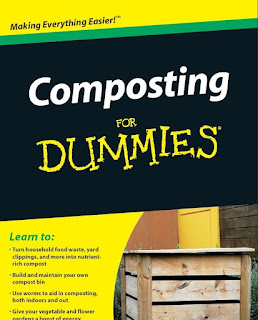- Get link
- X
- Other Apps
Posted by
Michel Haaring
- Get link
- X
- Other Apps
Composting For Beginners
Composting is one of the most important gardening tasks you need to learn if you want to become a successful gardener. It will help you grow healthy plants. In addition, composting is a very earth-friendly way of caring for your garden.
Get this Free E-Book :
Contrary to what some people might think, there is really nothing complicated about composting. Even a new gardener who has no experience can do it.
All you have to do is take organic waste from your house and garden and put it back into the earth. Eventually, the waste will decay and become part of the soil, making it richer and better fit for growing different kinds of plants.
Technically, any organic matter can become compost, but the best ones to use are those that can decay quickly and become fertilizer faster. Some of the usual compost materials used by gardeners are dry leaves and cut grass from the garden, manure, fruit peelings, and vegetable cuttings.
Composting is done on a large scale in farms and commercial plantations, but you can also do it on a smaller scale in your own backyard.
You can begin by digging a small pit in a corner of your yard where you are going to throw in your organic waste.
Try to find a place in the garden that is easily accessible for you but not for small children who might fall in or pets that might take out what you put in.
Composting For Beginners
Once you have filled up your compost pit with organic waste, cover it loosely with soil. The idea is to create a environment that is conducive for bacterial and fungal growth because these organisms are what will cause the organic waste to break down. Over time, the organic matter will decay and turn into a blackish, crumbly material with an earthy but not unpleasant odor, which is exactly what you want your compost to look like.
If you want to speed up the decomposition process, try combining greens with dry leaves and adding a layer of garden soil in between every few inches of other organic matter. Also, make sure that there is room for air to circulate and that the area is always kept slightly moist or humid.
As you can see, you don't need to have special skills or buy expensive equipment to build your own compost pit. Everything you need to put into the pit, you already have in your garden and kitchen. You simply need to remember to throw these things into the compost pit and not into the trash bin.
Once your compost fertilizer is ready, all you have to do is mix it in with the garden soil and see what happens. With all the nutrients contained in your new environment-friendly fertilizer, your plants will grow healthier and bigger than ever.
Don't worry if you are not able to produce the perfect compost fertilizer right away. In time, you will be able to improve your techniques and come up with better results.
Composting For Beginners
Happy composting :)
Cheers,
Michel









Comments